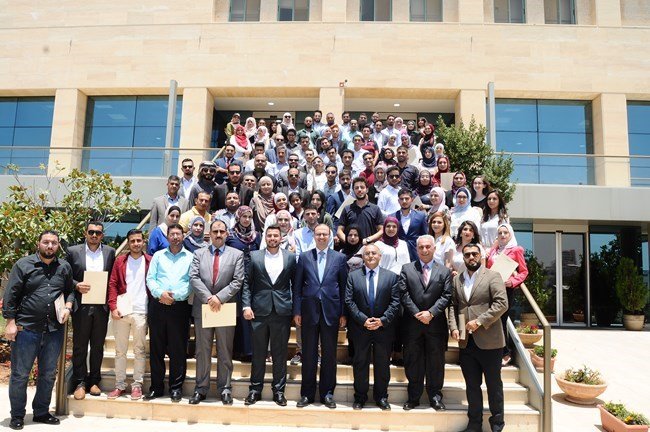Image:

16 Jul 2017
H.E. Dr. Mohammad Al Momani, minister of state for media affairs, patronized Monday at the Jordan Media Institute (JMI) the closing event for the Capacity Building for Local Radios. The year-long project brought together 146 volunteers and staff members working in seven local and community radios representing various governorates in the Kingdom. <br />
<br />
The project is executed by JMI in partnership with the UNESCO office in Amman as part of the “Support to Media in Jordan” program which is funded by the EU and executed by the UNESCO. <br />
<br />
The participating local radios are: Yarmouk FM, Jordan University Radio, Liqaa FM in Zarqa, Sawt Al Karak broadcasting from Mu’tah unviersity, Al-Tafileh Technical University Radio, Sawt al Janoub broadcasting from Al-Husayn Bin Talal University, and Sawt Al-Aqaba operated by ASEZA. <br />
<br />
Dr. Al Momani said that this ceremony culminates distinguished and fruitful efforts exerted over long months to enhance the capacity practitioners at the local radios as they uphold a true developmental role especially in the governorates providing platforms for dialogue among all segments of the one community over all kinds of challenges they face, and how to address them. <br />
<br />
He also hailed the training program as a huge opportunity for the local radios to offer distinguished and innovative radio production. He noted that this comes at a time when media in Jordan, local and community radios included, is going through a phase of sorting the quality from the quantity. The public has come to recognize the various radios on the basis of their quality output that touches its concerns and aspirations. <br />
<br />
Ms Costanza Farina, UNESCO representative to Jordan added that" Media plays a vital role in this process, striving to put into action Goal 16 of “Agenda 2030” calling for an enabling environment that ensures public access to information and fundamental freedoms. In taking this forward, UNESCO work aims to foster opportunities for local communities to express themselves in the media, and have access to media that is relevant to their day-to-day lives. The role of local radios is pivotal in ensuring the engagement of local communities and in providing a platform for democratic dialogue." <br />
<br />
In his speech, Dr. Basim Tweisi, JMI dean, reviewed the objectives achieved in the training program by developing the capacity of practictioners at the local and community radios which have flourished and achieved prominence in the Jordanian national scene. He noted that these radios have assumed its position in terms diversity of specialty and interest, and in terms of expanding outside of Amman and the governorates. This, he said, has provided many local communities with more opportunities to listen and participate in the versatile and diversified radio platforms. <br />
<br />
He also explained that over an entire year, 13 training course were offered in various domains pertinent to the development of radio content. These courses include, inter alia: Radio Packages, Documentaries, Talk Shows, Sound and broadcast, Social Media, Volunteer Management. <br />
<br />
He emphasized the need to develop the professionalism of the radios and build the capacity of their practitioners in order to reflect a national need to widen the platforms of expression, represent all segments of the society, come closer to the community’s priorities on development and participation, and expands the public debate on the general national policies and affairs. <br />
<br />
On behalf of the participants, both Lu’ay Ahmad of the University of Jordan Radio and Mai Qatamin of the Sawt Al Aqaba Radio spoke on how the training program offered by JMI highlighted new concepts of media and radio work, along with the innovative and creative techniques in presenting and producing various programs. <br />
<br />
They also stressed the need to encourage cooperation among the radios in order to elevate the professional and ethical standards pertinent to the radios, and to establish the principles of social responsibility they seek to uphold. <br />
<br />
The program was started by assessing the capacity of the volunteers and staff working at the targeted radios. The radio content was also evaluated. This formed the basis for a comprehensive training program and a plan to produce radio shows and news. <br />
<br />
The radios also received support in the domain of self-regulation by developing updated editorial policies that respond to the values of professionalism and independence and expand community dialogue. In the final analysis, each radio has its own editorial policy for news, gender and the youth. <br />
<br />
A basic framework was put forward to start off a collective organization by means of setting up an association for local and community radios designed to encourage networking and exchange of expertise. <br />
<br />



